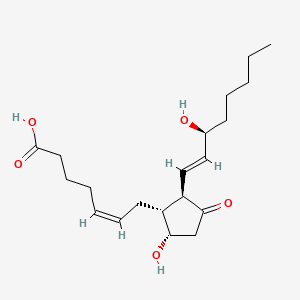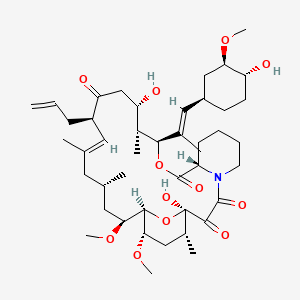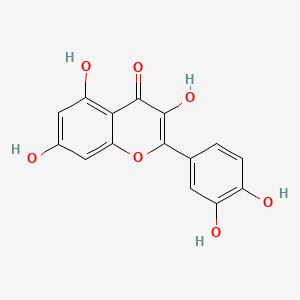Possible associated with:
| Structure | name | description | Reference count |
|---|---|---|---|

|
PGD2 | Pgd2 is a lipid of Fatty Acyls (FA) class. Pgd2 is associated with abnormalities such as Inflammatory disorder, Pleurisy, Rhinitis, Dehydration and Pneumonia. The involved functions are known as antagonists, fat cell differentiation, Phosphorylation, Process and Gene Expression. Pgd2 often locates in Cell surface, Body tissue, Extracellular, Bone Marrow and Membrane. The associated genes with PGD2 are oxytocin, 1-desamino-(O-Et-Tyr)(2)-, P4HTM gene, PTGS2 gene, PTGDS gene and IL3 gene. The related lipids are 15-deoxyprostaglandin J2, Nonesterified Fatty Acids, Lipopolysaccharides, Steroids and Liposomes. The related experimental models are Knock-out and Rodent Model. | 6464 |

|
tacrolimus | Tacrolimus is a lipid of Polyketides (PK) class. Tacrolimus is associated with abnormalities such as Renal glomerular disease. The involved functions are known as inhibitors, Fungicidal activity, Metabolic Inhibition, Excretory function and Dephosphorylation. Tacrolimus often locates in Hepatic, Mitochondrial matrix and Inner mitochondrial membrane. The associated genes with Tacrolimus are RHOA gene and BGN gene. | 12730 |

|
quercetin | quercetin is a lipid of Polyketides (PK) class. Quercetin is associated with abnormalities such as Coronary heart disease, Myocardial Infarction, Cirrhosis, Coronary Arteriosclerosis and Vascular ring. The involved functions are known as Vasodilation, physiological aspects, Fermentation, Process and Ingredient. Quercetin often locates in Arterial system, Endothelium, Skin, Endothelium, Vascular and Tissue specimen. The associated genes with quercetin are P4HTM gene, SULT gene, UGT1A1 gene, ARHGAP26 gene and PLXNB1 gene. The related lipids are blood lipid, Promega, Steroids, Phosphatidylserines and Fatty Acids. The related experimental models are Knock-out, Mouse Model, Xenograft Model, Tissue Model and Cancer Model. | 5377 |
Total
3